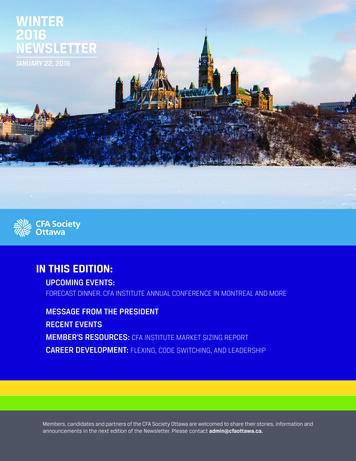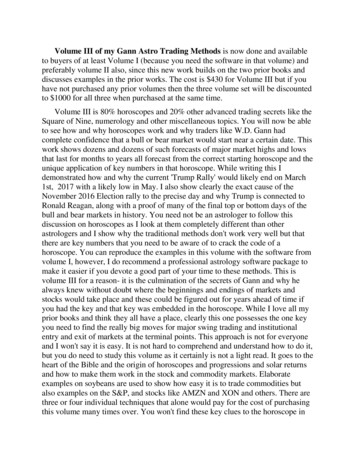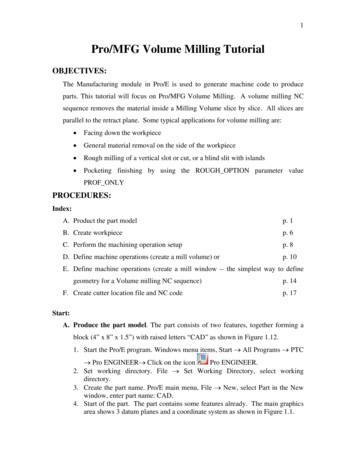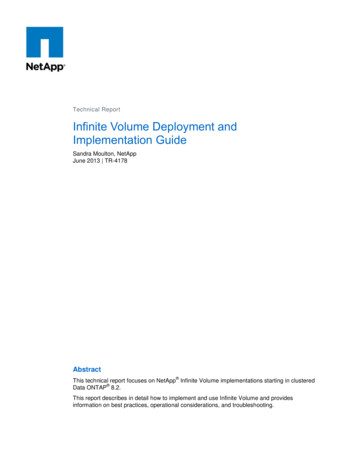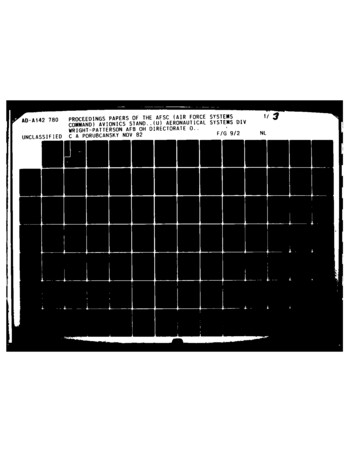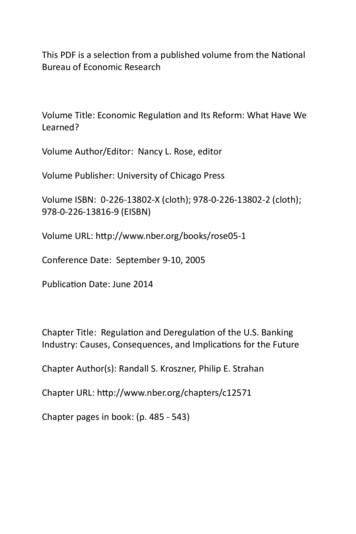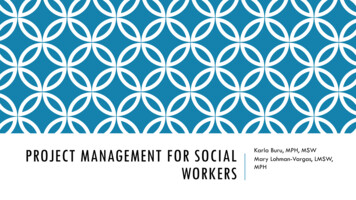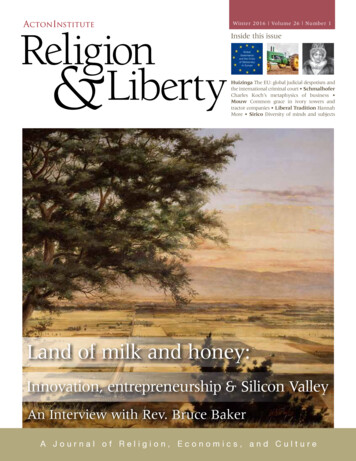
Transcription
ReligionLiberty&Winter 2016 Volume 26 Number 1Inside this issueHuizinga The EU: global judicial despotism andthe international criminal court SchmalhoferCharles Koch’s metaphysics of business Mouw Common grace in ivory towers andtractor companies Liberal Tradition HannahMore Sirico Diversity of minds and subjectsLand of milk and honey:Innovation, entrepreneurship & Silicon ValleyAn Interview with Rev. Bruce BakerA Journal of Religion, Economics, and Culture
Editor’s Notebook, Good Profit. While Koch’s previouswritings have been more nuts andbolts, this one focuses on the philosophyof business.Sarah StanleyAssociate EditorThe first issue of Religion & Liberty in 2016will explore several topics from a varietyof faith traditions: entrepreneurship, theInternational Criminal Court, businessphilosophy, common grace and the 18thcentury British abolition movement.Late last year I had the privilege of interviewing Rev. Bruce Baker, a SiliconValley veteran, entrepreneur, pastor andcollege professor. For this issue’s interview, he discusses the history of SiliconValley, technocracy, how Christians canbe “winsome” witnesses and more.Charles Koch, while widely admired inmany spheres, is completely disparagedin others. In a new review, StephenSchmalhofer tackles Koch’s latestWhether you run a company that manufactures farming equipment or you’re aprofessor of philosophy, you’re dealingwith common grace. Richard J. Mouwdiscusses the importance of commongrace in all spheres of life.The first chapter of Hebrews addressedthe nature of Christ. The Double-EdgedSword says that “Christ holds the worldtogether, and everything in creation isput under his authority and dominion”as our prophet, priest and king.The United States and the EuropeanUnion: the ultimate international “frenemies.” In this excerpt from his newbook, The New Totalitarian Temptation,Todd Huizinga discusses universal jurisdiction, the International CriminalCourt, and how fundamentally differentthe U.S. is from the EU.Acton’s executive director, Kris Mauren,explains the significance of the “One andIndivisible” conference series. Religiousand economic freedom have a significant and complex relationship. Thisconference is based on the SecondVatican Council’s Dignitatis Humanae,an important development that hasstrengthened the moral and legal casefor worldwide religious freedom. It alsoprovides the theological foundation forthe conference series.In the 18th century, one woman wasprofoundly influential in the abolitionmovement. Hannah More was a talented poet, playwright, moral writer andphilanthropist. Her powerful 1788poem, “Slavery,” drew attention to thehorrors slaves faced, making her a voicefor the British abolition movement.In his column, Rev. Robert Sirico reflectson the past, present and future, commentating on how this very issue of Religion &Liberty shows the diversity of vocations,beliefs and topics Acton addresses.Editorial BoardContentsPublisher: Rev. Robert A. SiricoExecutive Editor: John CouretasAssociate Editor: Sarah StanleyGraphics Editor: Peter HoLand of milk and honey:Innovation, entrepreneurship and Silicon ValleyInterview with Rev. Bruce Baker . 3The Acton Institute for the Study of Religion and Liberty promotes a freesociety characterized by individual liberty and sustained by religious principles.Letters and requests should be directed to: Religion & Liberty, Acton Institute,98 E. Fulton Street, Grand Rapids, MI 49503. For archived issues or tosubscribe, please visit www.acton.org/publicat/randl.The EU: global judicial despotism and theinternational criminal courtTodd Huizinga . 4Charles Koch’s metaphysics of businessStephen Schmalhofer . 6The views of the authors expressed in Religion & Liberty are not necessarilythose of the Acton Institute.Common grace in ivory towers andtractor companiesRichard J. Mouw . 8 2016 Acton Institute for the Study of Religion and Liberty.Acton FAQ . 10Cover Photo: “Santa Clara Valley” by Harold G. Peelor, circa 1900. LA County Museum of Art.In the Liberal Tradition Hannah More . 14Inside Photos: Pg3: Andy Grove, Robert Noyce and Gordon Moore in 1978. Source: Intel Free Press;Pg8: John Deere by Ted Van Pelt, 2012; Pg11: Prune Orchard near Santa Clara, CA.,WikimediaCommons; Pg14: Hannah More, painting by Henry William Pickersgill, 1873 Wikimedia Commons.2Column Rev. Robert A. Sirico . 15Religion&Liberty
R E V. B R U C E B A K E RLand of milk and honey:Innovation, entrepreneurshipand Silicon ValleyAn interview with Rev. Bruce BakerWhat is it about Silicon Valley? Why did thisagriculturally gifted valley give birth to somany of the world’s leading technology firmswhile simultaneously becoming the culturallandmark of the entrepreneurial spirit? Someonewho not only has studied the Valley extensivelybut also was part of several Silicon Valley giantsshares some insights with Religion & Liberty’sassociate editor, Sarah Stanley.R&L: In your work, you’ve asked a question thatmany others have asked about Silicon Valley:How did this “gratuitously gifted” region givebirth to so many world-class technology companies? But your explanation uses “biblical motifs”to describe the innovation and entrepreneurshipthere. How do you connect these biblical themesand concepts with the technical and very secularculture that prevails in Silicon Valley?Rev. Bruce Baker began his career interested inentrepreneurship and technology but was calledto the ministry two decades in. He received aBachelor of Science degree in applied science fromthe California Institute of Technology in 1978and a Master of Business Administration fromStanford University in 1981. Baker cofoundedFour Pi Systems Corporation, where he earnedfive patents for his inventions in X-ray physics,computer software and machine vision. After thecompany was bought out by Hewlett Packard in1992, Baker began managing in the brand-newdepartment of handheld mobile computingdevices at Microsoft. After four years at Microsoft,he was called to attend seminary. He received aMaster of Divinity degree from Fuller TheologicalSeminary in 2001 and a Doctor of Philosophy intheological ethics from the University of St.Andrews in 2010. He is ordained as a pastor inthe Presbyterian Church (USA) and serves asexecutive pastor of First Presbyterian Church inBellevue, Washington. In 2010, he beganteaching business ethics at Seattle PacificUniversity where he is also the main contributorto the scholarship and research activities of theCenter for Integrity in Business.Rev. Bruce Baker: I think we learnsomething about entrepreneurship andthe history of the Valley by using the biblical motif and looking at it through atheological lens. At the outset I need tosay that there’s also a risk here. The risk isthat we start to think there’s somethingreligiously motivated in this wave of entrepreneurship and technology, and there’snot. I don’t believe there is. Rather, whatI’m asking is, What can we learn abouthuman nature, about how entrepreneurship works and about what makes it agood thing for human flourishing? Whatcan we learn about that by looking at itthrough a biblical —————When I do that, the first thing I see is theparallel between the story of the originalfounders, the “Traitorous Eight” of Fairchild Semiconductor. Led by Bob Noyce,they became sort of the seed, the progenitors of generation after generation of theseinventive, productive, exciting technologycompanies that followed on after them,with Intel being the big one that camenext. Noyce was one of the founders ofIntel. It was in 1957 that they left Shock-ley Semiconductor, founded Fairchild andlaunched this new initiative. Now here arethe things I find in common: When I lookat it and compare what they did to theAndy Grove, Robert Noyce and Gordon MooreSource: Intel Free Press 1978Exodus story, it’s just interesting. In bothcases there’s a valley and there’s a landflowing with milk and honey.During the 20th century, it was called “TheValley of Heart’s Delight.” Everything grewthere: apricots, cherries, almonds, peaches,pears, plums. And so it was a garden. Inboth cases, there’s a visionary leader. Inboth cases, the people are entering thisnew land with an idea that they’re goingcontinued on pg 11 Winter 2016Summer2005 Volume Volume2615 Number Number1 13
The EU: global judicialdespotism and theinternational criminal courtBy Todd HuizingaThis essay has been excerpted from ToddHuizinga’s new book, The New TotalitarianTemptation: Global Governance and theCrisis of Democracy in Europe (EncounterBooks, 2016).The European Union’s goal of creating apost-nation-state, supranationally governed world—in which nations give upkey aspects of their national sovereignty toa web of international institutions thatadminister and enforce a body of international law—is diametrically opposed toU.S. identity and ideals. Americans instinctively refuse to recognize as legitimateany international organization, law ortreaty that claims any authority overAmericans above the U.S. Constitution,particularly if that organization, law ortreaty contradicts the Constitution or violates Americans’ constitutional rights.In the American system, it is becausesovereignty rests in the people that theU.S. government does not have a right totransfer sovereignty to any other organization, government or group of governments. But in the EU, the member stateshave been ceding ever more sovereigntyto “Europe” since the establishment ofthe European Coal and Steel Communityin 1952. Sovereign power is exactly whatthe European Union exercises over thenational governments of the EU memberstates. And again, for EU elites it is notjust about Europe. Their vision of supranational governance is a global one, andthat is why a political and moral clashbetween the American idea of demo-4cratic sovereignty and the EU’s agenda isunavoidable. Regardless of the eerie ambiguity of the global governance ideology, which lets it appear to be almostanything to anyone, there is at least thisone foundational certainty: the idea ofglobal governance, at its core, cannot butbe a sworn enemy to democratic sovereignty as practiced in the American system.The U.S.-EU dispute over the InternationalCriminal Court will graphically illustratethe seriousness of the break this differencein worldview portends.The International Criminal Court (ICC) isnot about bringing criminals to justice. Itis about giving teeth to global governance. It is about giving enforcementpowers to an international body that isnot accountable to any electorate or toany elected government—powers that inmany ways go beyond those of any dulyconstituted national court in a democratic country. For example, a U.S. citizen could conceivably be brought beforethe ICC on a charge that the U.S. government considers politically motivated andillegitimate, and be subject to prosecution and punishment without benefitingfrom several key rights that the U.S.Constitution guarantees to those who areprosecuted in U.S. courts.With its sensitivity to national sovereigntyand the constitutional rights of its citizens,the United States cannot accept this. TheEU on the other hand, with its belief inglobal governance, is the world’s most enthusiastic champion of the ICC. The EU’sardor for the ICC is undampened by thefact that its own citizens could be subjectto arbitrary prosecution without enjoyingrights that various EU member states guarantee their citizens—and this is testimonyto how deeply committed the EU elites areto supranational global governance.The ICC is a logical outgrowth of the notion of universal jurisdiction, which theAmerican sovereigntists Lee Casey andDavid Rivkin define as the claim that “anystate can define and punish certain ‘international’ criminal offenses, regardless ofwhere the relevant conduct took place orwhat the nationality of the perpetrators orvictims may be.” Universal jurisdictionsuggests that any country can prosecuteanyone for anything it has defined as aprosecutable crime, even if the allegedcrime was committed thousands of milesoutside of that country, and even if neitherthe perpetrator nor the victim of the alleged crime has ever set foot in that country or had any connection whatsoeverwith that country. Presumably, the rightof universal jurisdiction would be limitedto certain types of crime and certainwell-defined circumstances that havebeen internationally agreed upon.Whether or not universal jurisdiction islimited in that way, however, it remainsbreathtakingly broad in scope, arrogant,intrusive and predatory upon nationalsovereignty. Any nation that presumes toapply universal jurisdiction to prosecutecrimes that have not affected it or its citizens in any direct way is arrogating toReligion&Liberty
itself the power not only to decide whatis right and wrong for other countries,but to enforce that decision by supplantingthe judicial processes of other countriesand possibly imprisoning their citizens.Universal jurisdiction goes so far as toclaim the right to prosecute officials ofother governments for actions taken “inthe execution of their official duties” evenif those actions were “otherwise consistentwith the laws and constitution of theirown country.”All of the EU member states have somesort of universal jurisdiction law on thebooks, of varying levels of reach and intrusiveness. In the EU, the mission to buildthe soft utopia of a globally governancedworld goes on.The ICC is the next step in the universaljurisdictionists’ quest for cosmic justice,as Thomas Sowell might put it. As thefirst permanent international court dealing in criminal matters, the ICC “hascompetence to investigate, try and punish dozens of offenses,” currently withinthree broad categories: genocide, crimesagainst humanity, and war crimes, with afourth category, “aggression,” to be included as of 2017 if approved by stateparties. What is truly unprecedentedabout the ICC is its supranational authority, which could reach even to citizens ofcountries that are not signatories of theRome Statute, the treaty establishing theICC. In violation of previously construedinternational law, the Rome Statute invests the court with the authority toprosecute citizens of non–state parties,even, under certain circumstances, forcrimes committed on the territory ofnon–state parties. Also, the reach of theICC extends to government officials whowould traditionally enjoy official governmental immunity in the performance oftheir official functions.Thus, an American citizen could conceivably be prosecuted by the ICC for an alleged crime committed on U.S. soil. Forexample, the ICC could prosecute a Pentagon official if the ICC believes an attackordered by that official against a countrywith which the U.S. was at war to be awar crime. And it is by no means clearhow it is to be determined that a “warcrime” has occurred. It is quite conceivable that this Pentagon official could beaccused of a war crime if civilians wereunintentionally injured or killed or civilian property damaged. It is this pretenseof supranational authority, crowned byan assertion of jurisdiction over non–state parties, that is the heart of the ICC’sunacceptability to the United States. Forthe EU it is just the opposite. It is exactlybecause of this supranationality that theEU values the ICC as a major step forward for global governance. And thestory of the decades-long dispute between the United States and the EU over“ Why should the UnitedStates expose U.S.citizens to the possibilityof being tried, convictedand sent to jail by peoplewho are not in anyway subject to theConstitution of theUnited States?“the ICC is a chilling illustration of howthe global governance movement aims toimpose its vision on all who resist it.This European policy of actively undermining U.S. attempts to protect U.S. citizensand their constitutional rights came fromthe top, animated by the EU commitmentto building a world in which no countryhas the right to opt out of the pursuit ofuniversal justice. Senior government officials from European countries includingGermany and Belgium publicly criticizedU.S. efforts as “undermining justice,” as“incompatible with the rule of law,” and as“a blow to the credibility of internationallaw.” For the European global governancers, this was not just a disagreement overan isolated issue. Rather, opposing thiscore U.S. national sovereignty concern—the concern to protect U.S. citizens froman essentially unaccountable internationalcourt—had arguably become central to anemerging European identity. Many Europeans saw the dispute over non-surrenderagreements as “a question of values regarding the role of international law,” andan issue that went “to the core of the European perception of the world, of anemerging European identity.” Of course,European advocates of the ICC insist thatit poses no threat to the United States.They maintain that politically motivatedprosecutions in the ICC are not possible.But as illustrated by the Belgian courts’inquiries into the actions of George H. W.Bush and Colin Powell, among others,there is no reason to believe that otherU.S. and allied officials could not be subject to frivolous investigations by an unaccountable ICC. In fact, there have beenmany calls to bring George W. Bush, TonyBlair and other policy makers involved inthe Iraq war before the ICC.Why should the United States expose U.S.citizens to the possibility of being tried,convicted and sent to jail by people whoare not in any way subject to the Constitution of the United States? Indeed, whyshould any country that cares about itscitizens subject itself to the whims of theICC? How could the EU support such aninstitution, unless the ideological blindersof global governance have completelydistorted its perspective on reality?The story of the ICC makes clear that theEuropean commitment to global governance, while now still “manageable,”could one day become as passionate andinflexible as it would have to be in orderto realize the European dream on aglobal scale. If that ever happens, theprice of maintaining a strong transatlantic alliance will have become a price toohigh to pay.Todd Huizinga is director of internationaloutreach at the Acton Institute and was a U.S.diplomat from 1992–2012. Winter 2016 Volume 26 Number 15
Charles Koch’s metaphysicsof businessBy Stephen SchmalhoferReview of Good Profit: How Creating Valuefor Others Built One of the World’s MostSuccessful Companies by Charles Koch(Crown Business, 2015)Adam Smith, a venerable supporter of freeenterprise, held businessmen in low regard,alleging that their every meeting “ends in aconspiracy against the public, or in somecontrivance to raise prices.” While deference is due to his lasting insights into thesources of the values of men in The Theoryof Moral Sentiments and their success in TheWealth of Nations, I observe that many executives tout their “core values,” but not allof these companies are successful. Businessman and philanthropist Charles Kochis successful by any financial measure. Hisunique approach to the creation of valuepositions him against Smith’s caricature ofscheming backroom businessmen.Since 1967, Koch has overseen operationsat Koch Industries where he developedand implemented “Market-Based Management.” Following a large acquisition byKoch Industries in 2004, he urgently systematized the method and continues toshare it. Koch’s first book on the methodwas grandiosely titled The Science of Success:How Market-Based Management Built theWorld’s Largest Private Company, but in2015, he reentered the marketplace ofideas with a more accessible version—GoodProfit: How Creating Value for Others Built Oneof the World’s Most Successful Companies.Removing the pretense of science from thetitle better reflects the method’s foundation6in the ideas of spontaneous order and theprice system articulated by Austrianeconomist F.A. Hayek. Koch Industries’business model is based on acquiringcomplementary companies that eitherenhance or can be improved by theperformance of existing Koch businessunits. Koch managers seek to integratethese new acquisitions into the company’soperations to realize the expected gainsfrom economies of scale and knowledgesharing. But this integration can blunt theinformation signals provided by externalnetworks as well as create wasteful internalpolitical battles, especially over budgetsand other signs of corporate statusunrelated to “good profit.”To reduce the sclerotic effects of bureaucracy, Koch reintroduces internal marketpractices. For example, when one Kochbusinesses purchases products from another Koch business, the transactions aredone at prevailing market prices, not witha “family discount.” Internal support services, such as accounting or credit, compete alongside external service providers toearn the right to serve each Koch business.This is done to ensure good stewardship ofeconomic resources (opportunity cost) andalso to avoid wasting human talent andcreativity (comparative advantage).Koch’s book is more business philosophythan process. The book brings to life theobservation of Binx Bolling in WalkerPercy’s The Moviegoer that “businessmen areour only metaphysicians.” The end towhich Koch orders the actions of hiscompany of more than 100,000 people is toearn “good profit” by striving “to be thecounter-party of choice to our customers,vendors, communities, and employees.”Striving for this end requires the constantdiscernment of what your customers valueand for how much. To discern and ideallyanticipate what your customers needrequires a set of personal values to guidedecision-making within the organization.In Market-Based Management, the cardinal“guiding principle” is integrity.Too often integrity is offered up like justanother generic corporate value, but trustand reputation are at the heart of commercial life. When a business like online retailerAmazon operates with integrity and a deepcommitment to all of its customers, enormous opportunities are created. Netflix, thepopular video-streaming service, is a significant business customer of Amazon WebServices (AWS), the cloud-computing platform powering the e-commerce giant andavailable as a service to startups and Fortune 500 corporations alike. Netflix choosesto use AWS despite competing directly withAmazon Instant Video’s streaming service.The rise of highly valued and popular twosided network or marketplace businessesmay signal that economist Ronald Coase isdue for a revival. The Nobel laureate’s 1937article answered an ambitious question:Why do firms exist? His simple butpowerfully developed response was thattransaction costs are not zero and are notignored by entrepreneurs. Traditionally,entrepreneurs respond to these costs withReligion&Liberty
vertical integration and other supersessionsof the price system. At Koch, the formationof employees and selection of partners andcustomers with integrity is emphasized,partly due to the human duty of moralaction but also because of the saved “timeand money spent on controls, contracts,litigation, and security.”The internet has helped entrepreneurs slimdown the scope of their firms, insteadfacilitating peer-to-peer connections (e.g.,dating apps) or commerce (e.g., Etsy,Thumbtack). The speed of communicationhas aided growth, but the most successfulmarketplace businesses have developedways of signaling the reputation andintegrity of buyers and sellers. Newbusinesses are providing transparency andaggregating reputation so customers andproducers can make better decisions (e.g.,TripAdvisor, Yelp, Angie’s List). This is bothtransactional (Where should I stay on mytrip?) and character forming (How can ourteam better serve others?).Good Profit only briefly notes Charles Koch’spolitical activities. While the political pressfocuses on his electoral gamesmanship,Koch spends a significant amount of hisphilanthropic time and money supportingresearch and education to enhance thepublic’s understanding of the integrity offree enterprise. A loss of confidence in freeenterprise emerges from the growth of“crony capitalism,” as a Legatum Institutesurvey reports that 65 percent of Americansbelieve most big businesses have dodgedtaxes, polluted or bought favors. In otherwords, a majority of Americans believelarge corporations lack integrity. For hispart, Charles Koch has advocated (in theWall Street Journal and elsewhere) for anend to government subsidies andprotectionism favoring some industries,producers and consumers over others.Returning once more to the creation ofvalue, Koch predicts that with the end ofcorporate welfare and the restoration ofintegrity in enterprise, “[O]ur economywill rebound. Our liberties will be restored.”Stephen Schmalhofer writes from New York City.Double-Edged Sword:The Power of the WordHebrews 1:1–4God, after He spoke long ago to the fathers in the prophets in manyportions and in many ways, in these last days has spoken to us in HisSon, whom He appointed heir of all things, through whom also Hemade the world. And He is the radiance of His glory and the exactrepresentation of His nature, and upholds all things by the word ofHis power. When He had made purification of sins, He sat down atthe right hand of the Majesty on high, having become as much betterthan the angels, as He has inherited a more excellent name than they.Christ is appropriately called the Word because he is the final revelation, imageand voice of the Father. Christ is the elected one from all eternity to bridge thedivine-human divide. The one who reconciles us to the Father.The good news is that Christ is the one who helps us understand the fullness andheart of the Father. Some have mistakenly tried to separate the Son from theFather: either by incorrectly asserting that Christ was not divine or that Christappeases an angry or vengeful God. But it is important to remember that they arethe same substance and Jesus perfectly reflects the likeness and will of the Father.“He manifested himself by a body that we might receive a conception of the unseen Father,” declared Augustine.Christ too fully reminds us and assures us that the will of the Father includeshumanity in his eternal plan.This passage offers an excellent overview of the offices of Christ, which include“Prophet,” “Priest” and “King.” Even more, Christ holds the world together, andeverything in creation is put under his authority and dominion.Also mentioned is the deliverance from sin through Christ, reminding us thatthough he was made low through his humiliation on the cross on our behalf, Godhas bestowed on him a seat at his right hand. Jesus receives the highest honorand is given full glory but continually advocates for us. Even more, he continuesto share our human form and bear the marks of his suffering. There is never atime that Christ will not share in human form. That truly is the great news of theincarnation and God’s love for us. Christ unites us eternally to the Trinity throughthe incarnation.The writer of Hebrews makes a critical claim within the passage, and that again isthat Christ holds all creation together. It’s, of course, an amazing counterculturalclaim to so many. But it’s a principle truth of Scripture and Christian life. It’s anamazing assurance that we are included in the life of God, and he has an eternalpurpose for us. Winter 2016 Volume 26 Number 17
Common grace in ivorytowers and tractorcompaniesBy Richard J. MouwExcerpted from “Getting the trophies ready:serving God in the business world,” an essaywhich first appeared in the Journal of Markets and Morality Spring 2015 issue. In thisessay, Mouw discusses three “Kuyperianspheres” of service: academia, business andthe church.Most of the time, most of us make thelinguistic transitions in our daily livesquite smoothly. We work alongside ourcolleagues, stop at the grocery store tomake a purchase, go home to a familymeal and then relax in front of our TVsets as spectators in the world of athletics. In all of that, we encounter differentlanguages. How we talk at the workplacediffers from our meal table conversations, and the vocabulary of the commentators on ESPN is yet another pattern of speech. We typically navigate allof that with no awareness that we havesuccessfully made our way through avariety of Kuyperian spheres.Sometimes, though, the boundaries between spheres are crossed only withgreat linguistic difficulty. This has certainly been true often in encountersamong scholars in the academy andpractitioners in the business world. Asan academic who has often done sometraveling between those two spheres, Ican testify to the fact that communication between inhabitants of the twospheres has not always been easy. Sometimes it is simply a problem of understanding each other’s language, but frequently the difficulties are rooted indeeper problems.John CalvinArt by Hans Holbien. Source: Wikimedia Commons8I can testify, wearing my academic hat,that we often have had difficulty talking toand about business practitioners becauseof a suspicion about what we think is reallygoing on in the marketplace. Sometimesthe suspicion has to do with a discomfort inthe presence of wealth. Many of us havestarted our academic careers with significant financial debt, and we see ourselvesas awkward financial managers. Sometimes the suspicion is more ideological innature: To be trained in the academy isoften to hear quite a bit of anticapitalistrhetoric, embodied in oversimplificationsof what competition and profit-makingare all about. Understandably, then, leaders in the business community often avoid“ it can be tough onthe people who teachbusiness in colleges andun
Charles Koch, while widely admired in many spheres, is completely disparaged in others. In a new review, Stephen Schmalhofer tackles Koch’s latest book, Good Profit. While Koch’s previous writings have been more nuts and bolts, this one focuses on the ph

